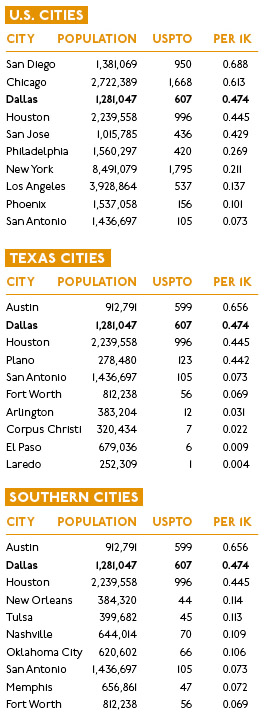Ever since I started covering the invention beat for Dallas Innovates, I’ve been wondering how many intellectual property attorneys there are in North Texas, and how that number measures up to other major metropolitan areas. As it turns out, those questions are harder to answer than you might think.
For example, the State Bar of Texas told me that its Property Law Section has 582 active members from Dallas County. But putting that number in perspective is difficult, because the American Bar Association’s Section of Intellectual Property Law declined to share statistics on its members’ geography.
“If you want a patent that’s going to withstand the test of time — if you want a patent that’s going to be worth anything — then you need a patent attorney,” says Plano inventor Michael Messer.
However, the United States Patent and Trademark Office maintains a searchable database of patent practitioners — patent attorneys and patent agents who are licensed to practice before the USPTO. The difference, in short, is a law degree; both patent attorneys and patent agents must have an undergraduate degree in a hard science such as physics and chemistry. (Here’s a simple, if self-serving, explanation from a Chicago patent attorney.)
“If you want a patent that’s going to withstand the test of time — if you want a patent that’s going to be worth anything — then you need a patent attorney,” says Plano inventor Michael Messer, who recently received a patent for the Simple Stir with help from attorney Mark Handley. “The majority of the times that anybody tries to patent their invention on their own, the language isn’t going to be as precise as necessary to withstand a court case. So you really want to rely on those who are licensed in the practice of IP law to go that direction. You really don’t want to try to do it on your own.”
Each practitioner licensed by the USPTO has to register an address in a particular city, which allows us to compare Dallas to the other most populous cities in the nation and the state.
Disclaimer: This is going to leave out all of the qualified patent practitioners from suburbs such as Plano and Richardson (123 and 50, respectively, as of this week), not to mention Handley, who has offices in Colleyville and Plano but is registered with the USPTO as a Grapevine attorney. But there’s just no good way to compare entire metropolitan areas and make it an apples-to-apples comparison — especially when you consider that the Dallas-Fort Worth area is spread over multiple counties. For a time, I considered tabulating the numbers of patent practitioners from all of the cities within the nation’s most populous counties. But then I found out that Los Angeles County is comprised of more than 80 cities, and I nearly choked when I discovered that there are more than 130 in Cook County, Ill. That research will have to be left to someone with far more interest in this topic than me.

As of this week, 607 individuals with Dallas addresses were recognized to practice in patent matters before the United States Patent and Trademark Office. According to the U.S. Census Bureau, Dallas’ population was estimated at 1,281,047 in 2014. Those two figures tell us that Dallas has 0.474 patent practitioners per 1,000 residents, a per capita number that ranks behind only San Diego and Chicago among the nation’s 10 most populous cities. (When ranked by population, Dallas comes in ninth.)
If you compare Dallas to the rest of Texas’ largest cities, it’s second only to Houston in total number of patent practitioners and second only to Austin in patent practitioners per capita.
When the USPTO was selecting locations for its four regional offices, it wanted to distribute them in four different time zones. With the other three located in Detroit, Denver, and San Jose, it fell to the Central Time Zone’s office to also represent the Southern portion of the United States. Dallas is second per capita among the other largest Southern cities in the zone.
Thanks to the USPTO’s choice to office in Dallas, Messer expects the number of patent practitioners in Dallas and the region to only go up.
“I’m fairly certain that there’s going to be a veritable plethora of patent attorneys that pop out of nowhere now that the USPTO has a branch in Dallas,” he says. “They’re going to be coming out of the woodwork.”
For a daily dose of what’s new, now, and next in Dallas-Fort Worth innovation, subscribe to our Dallas Innovates e-newsletter.


























